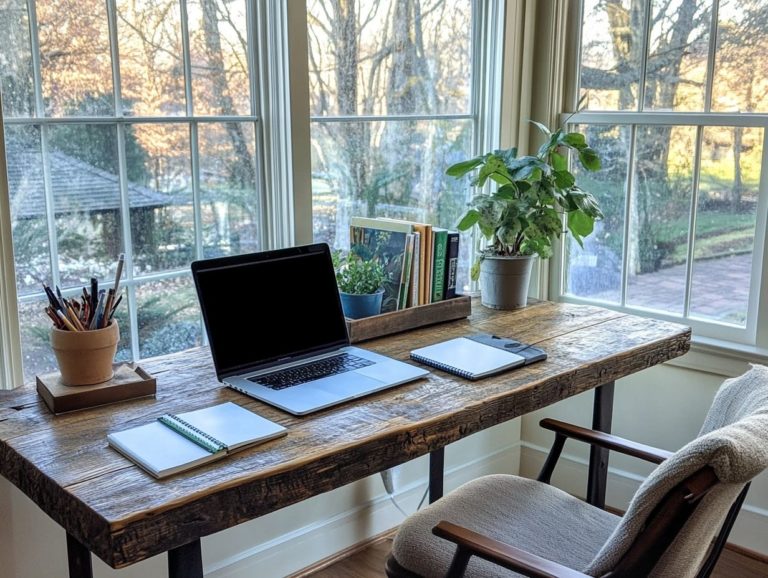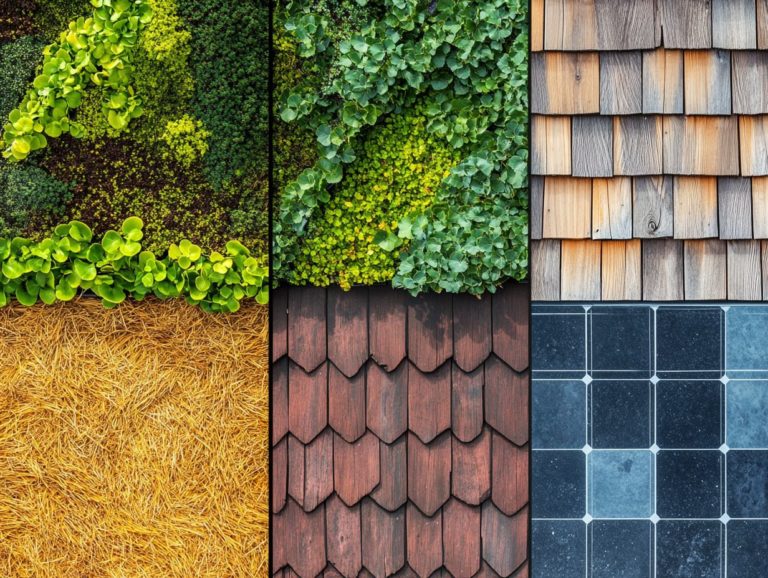The Benefits of Using Cork as a Flooring Material
Cork flooring is quickly becoming a sought-after option for those desiring an eco-friendly and stylish addition to their homes!
Its unique texture and natural warmth elevate the aesthetic of any space. Additionally, it offers a wealth of practical benefits.
With environmental advantages, remarkable durability, and effortless maintenance, cork flooring distinguishes itself in today s marketplace.
Contents
Key Takeaways:
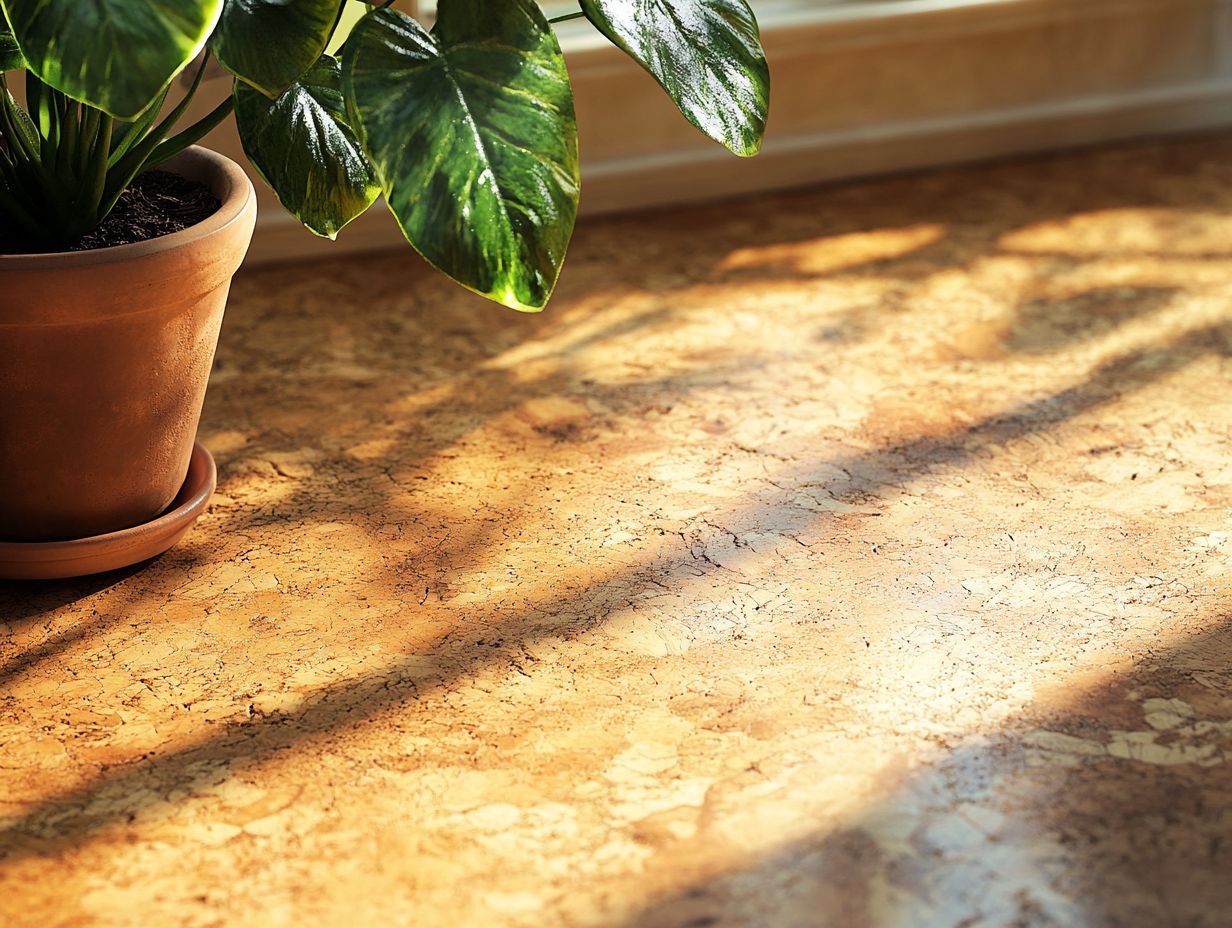
Cork flooring offers environmental benefits, making it a sustainable and eco-friendly option for flooring.
With its durability and low maintenance requirements, cork flooring is a practical and cost-effective choice for many homeowners.
The versatility and aesthetic appeal of cork flooring, with its variety of styles and finishes, make it a stylish and unique option for any space.
What is Cork Flooring?
Cork flooring is an exceptional choice crafted from the bark of the cork oak tree, also known as the cork oak tree. This material is renowned for its eco-friendly attributes.
Not only is cork flooring visually appealing, but it also boasts benefits like natural insect repellency and remarkable comfort.
It has heat-retaining qualities, making it ideal for both residential and commercial environments.
Hailing mainly from the Mediterranean region, the cork oak tree flourishes in warm climates. This tree can live for over 200 years!
This longevity allows for harvesting every nine years without causing harm to the tree. Thus, it is a truly sustainable resource!
The unique composition of cork, characterized by a network of microscopic cells filled with air, lends it lightweight yet resilient qualities.
You ll find a variety of cork flooring options available, including tiles and planks. They come in numerous colors and textures to complement any interior design.
By choosing cork flooring, you elevate the aesthetics of your space and embrace sustainable living. This makes it a favored option among eco-conscious homeowners and businesses alike.
Advantages of Cork Flooring
Cork flooring offers a wealth of benefits that make it enticing for both homeowners and builders. Its natural insect repellency and excellent insulation properties are just the beginning!
This flooring choice captivates the eye and is a renewable resource, perfectly aligning with the increasing desire for environmentally friendly home improvement solutions.
Environmental Benefits
One standout environmental benefit of cork flooring is that it s a renewable resource. Harvested from the cork oak tree, it can be collected without causing harm to the tree itself.
This process aids in forest conservation and helps reduce carbon footprints, making cork an ideal option for eco-conscious individuals.
Cork oak forests play vital roles in carbon sequestration, effectively storing significant amounts of carbon dioxide throughout their growth cycle.
Choosing cork flooring supports these amazing trees and their ecosystems, fostering biodiversity in these woodlands.
Unlike traditional flooring materials, cork naturally resists mold and pests, enhancing indoor air quality. This remarkable blend of sustainable harvesting and environmental stewardship makes cork a superb alternative for anyone looking to lessen their environmental impact!
Consider cork flooring for your next home improvement project, and enjoy the aesthetic and practical benefits it offers!
Durability and Maintenance
Cork flooring stands out for its remarkable durability, effortlessly handling heavy foot traffic and daily wear while requiring minimal maintenance and occasional sealing to extend its lifespan.
By understanding the details of cork flooring maintenance and repair, you can ensure that your floors remain pristine for years to come. The resilient nature of cork makes it particularly resistant to dents and scratches. This is an invaluable feature for households with children or pets.
To keep its appearance fresh, regular vacuuming will effectively remove dirt and debris that could lead to scratches over time. If you’re interested in enhancing the longevity of your cork flooring, periodic sealing with an appropriate product will safeguard it against moisture and wear.
Should any damage occur, you can easily address it by using a cork floor repair kit or applying a suitable sealant to cover minor imperfections, ensuring your flooring continues to look as pristine as the day it was installed.
Design and Aesthetic Appeal
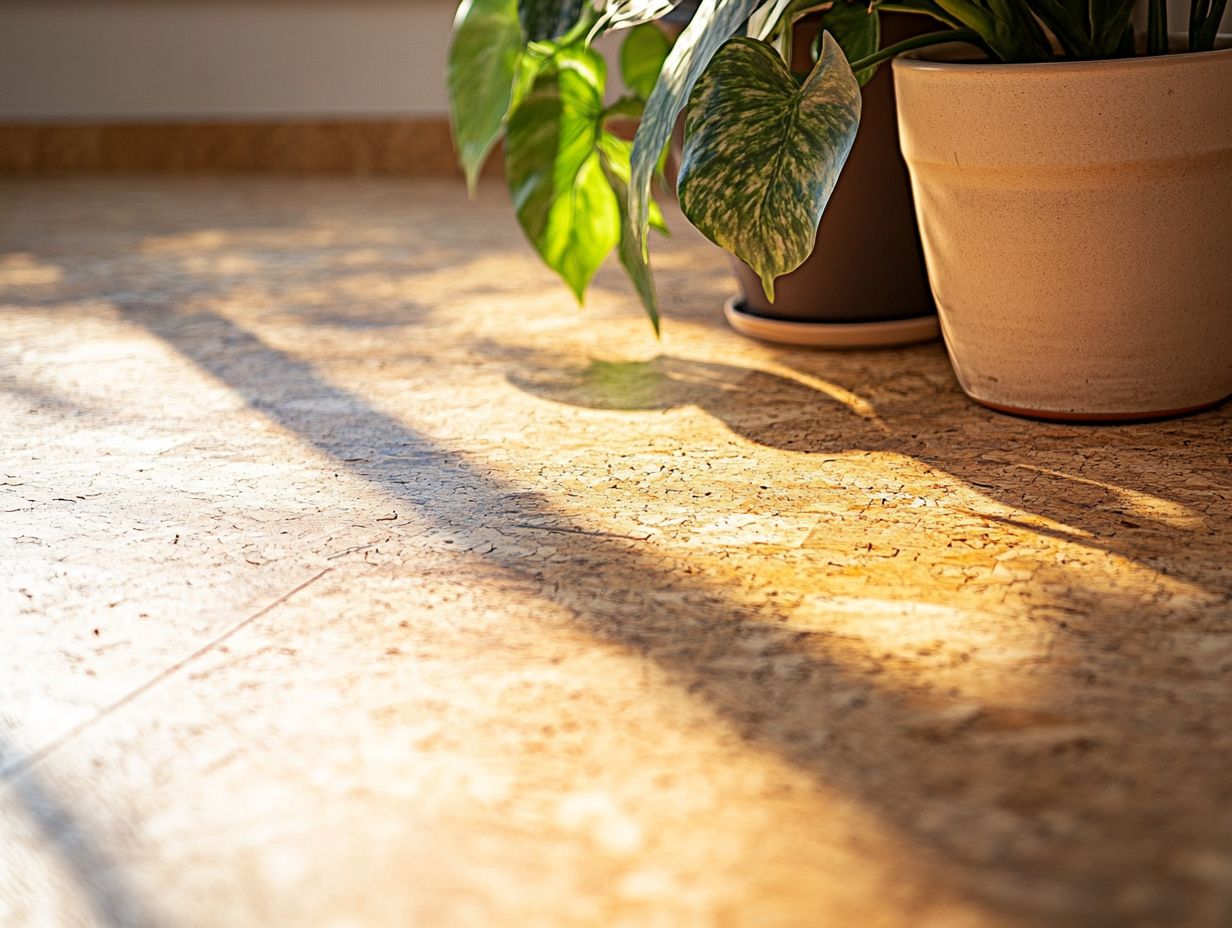
Cork flooring offers an impressive array of designs, styles, and finishes tailored to meet your distinct aesthetic preferences and home improvement aspirations, making it a remarkably versatile choice for any interior space.
Whether you lean towards natural tones or prefer vibrant hues, the unique patterns and textures of cork flooring can significantly elevate the visual allure of both residential and commercial environments.
Variety of Styles and Finishes
The array of styles and finishes in cork flooring lets you choose options that perfectly align with your personal taste and home decor whether you lean towards sleek modern aesthetics or prefer a touch of rustic charm.
This versatility opens up endless possibilities for crafting stunning and functional flooring solutions in any space.
For instance, imagine polished cork tiles infusing elegance into your contemporary living room, reflecting light and adding a sophisticated flair. Meanwhile, textured surfaces create a warm, inviting atmosphere, ideal for cozy bedrooms or rustic kitchens.
If you’re drawn to an organic, earthy feel, natural cork beautifully marries style with sustainability, making it a perfect choice for eco-conscious individuals.
Patterns in cork can become statement pieces, transforming hallways or entryways into captivating focal points. The unique characteristics of cork flooring elevate the aesthetic of a room while offering practical benefits like sound absorption and thermal insulation, keeping your home warm in winter and cool in summer. This makes it an excellent choice for any home.
Installation and Cost Considerations
When contemplating cork flooring, you’ll find that both installation and cost are pivotal factors in your decision-making process.
By understanding the details of cork flooring costs and installation methods, you can make informed choices that align with your budget and personal preferences.
DIY vs. Professional Installation
When you re caught between DIY cork flooring and calling in the professionals, consider your skills, time, and budget. Each option has its own set of advantages and challenges, so it s essential to weigh your capabilities against the perks of hiring a pro for a seamless installation.
If you re a DIY enthusiast, the satisfaction of a hands-on approach can be quite rewarding. You get to personalize your space and save some cash along the way.
Just remember, achieving that polished, professional finish demands a bit of expertise and the right tools think flooring cutter, measuring tape, and adhesive for those glue-down options.
On the flip side, opting for professional installation ensures a hassle-free experience, often resulting in enhanced durability and aesthetics. However, this convenience comes at a cost.
By carefully weighing these factors, you ll be well-equipped to make the choice that best fits your needs, ensuring your cork flooring project is a resounding success.
Comparing Costs to Other Flooring Options
Comparing costs is vital to get the best value! When evaluating cork flooring costs, it s important to compare them with other popular options like bamboo, laminate, carpet, vinyl, linoleum, and marble.
This comparison will provide a clearer understanding of the overall value cork offers, helping you make informed decisions based on your budget and flooring needs.
By breaking down both the initial investment and ongoing maintenance expenses of each alternative, you can determine which flooring type fits within your financial plan while delivering long-lasting benefits.
For instance, while bamboo may catch your eye with its eco-friendly appeal and similar look, its vulnerability to moisture could lead to higher repair costs later on.
Laminate flooring might seem like a bargain upfront, but its tendency to wear out quickly may result in frequent replacements that could drain your wallet.
Vinyl is attractive due to its affordability and ease of cleaning, yet it often lacks the durability of cork or marble.
Therefore, taking the time to examine each material’s strengths and weaknesses will guide you toward the most cost-effective and practical choice for your home.
Caring for Cork Flooring
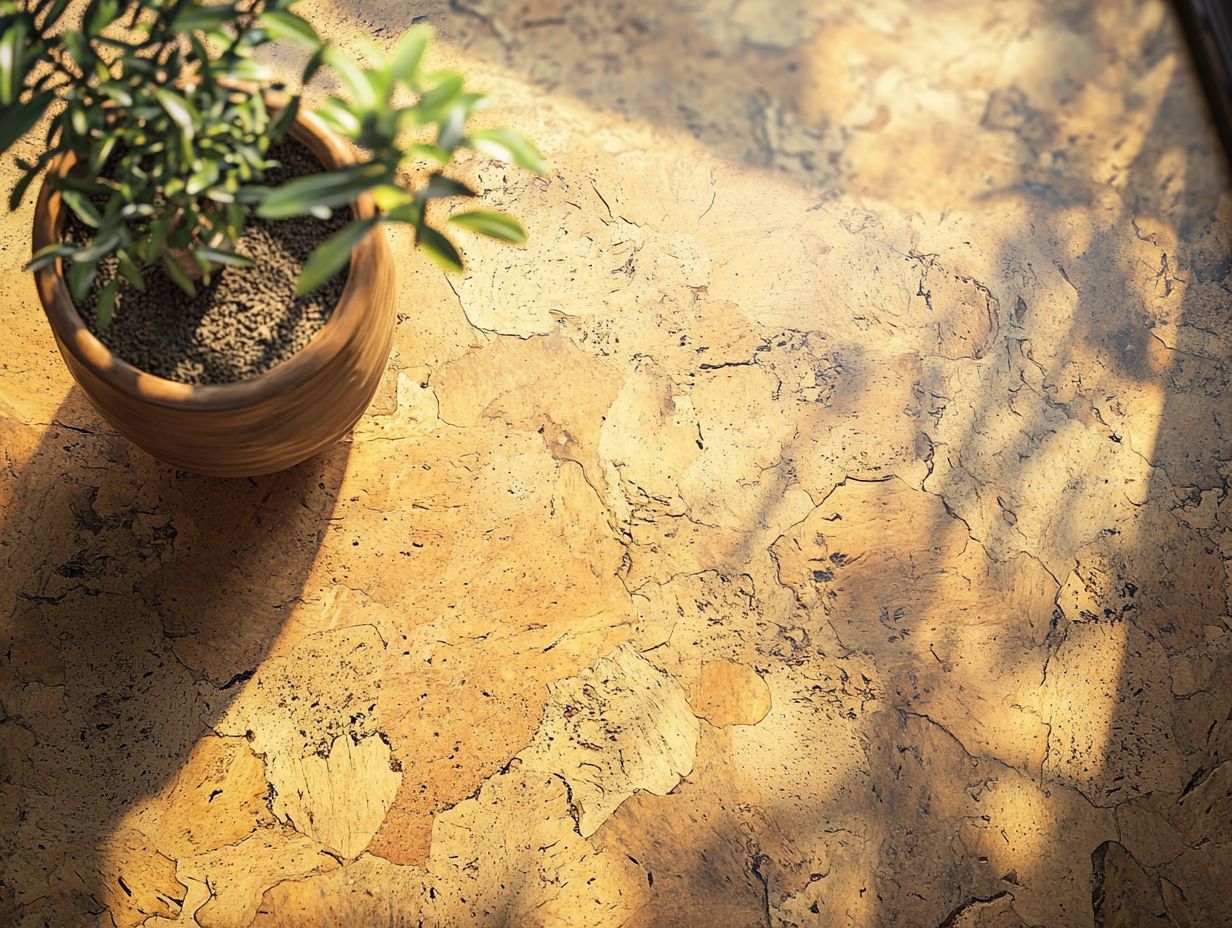
Proper care and maintenance are essential for preserving the integrity and appearance of your cork flooring. Regular cleaning and upkeep will prevent damage and extend its lifespan.
By following key maintenance tips for cork flooring, you can keep your floors beautiful and functional for many years.
Tips for Proper Maintenance and Cleaning
- To keep your floors looking great, implement proper maintenance practices.
- Regular vacuuming, occasional sealing, and promptly addressing spills will help maintain peak condition.
- Vacuum gently with a soft-bristle attachment to avoid scratches.
- Seal cork floors every few years with a safe, clear sealant to protect them from moisture and wear.
- Clean spills immediately with a damp cloth to avoid staining or warping.
- For tougher spots, a mild soap and warm water mixture can work wonders.
- Choose eco-friendly cleaning products to preserve cork s natural properties and contribute to a healthier home environment.
Potential Drawbacks of Cork Flooring
While cork flooring has numerous benefits, it also comes with potential drawbacks to consider. Its vulnerability to moisture damage and the need for proper maintenance are important factors.
By addressing these concerns about cork flooring, you can make informed and confident decisions as a potential buyer.
Addressing Common Concerns
When addressing common concerns about cork flooring, consider issues like moisture resistance and potential damage, as these can impact the flooring’s longevity and appearance.
Understanding how to perform cork flooring repair can also help mitigate some drawbacks. Prioritize proper installation techniques and opt for high-quality finishes that enhance moisture resistance.
Regular maintenance like sealing the surface and cleaning spills promptly can greatly extend the life of your cork flooring.
If problems arise, simple repair processes like patching scratches or replacing damaged tiles offer cost-effective solutions.
With a few essential tools and the right guidance, navigating the repair process can be straightforward, reassuring you that cork flooring is an excellent long-term investment for your home.
Frequently Asked Questions
Have questions about cork flooring? Here are some common queries to consider:
- What is the lifespan of cork flooring?
- How do I clean cork flooring effectively?
- Can cork flooring be repaired if damaged?
Ready to choose the best flooring for your home? Start exploring your options today!
What are the main benefits of using cork as a flooring material?
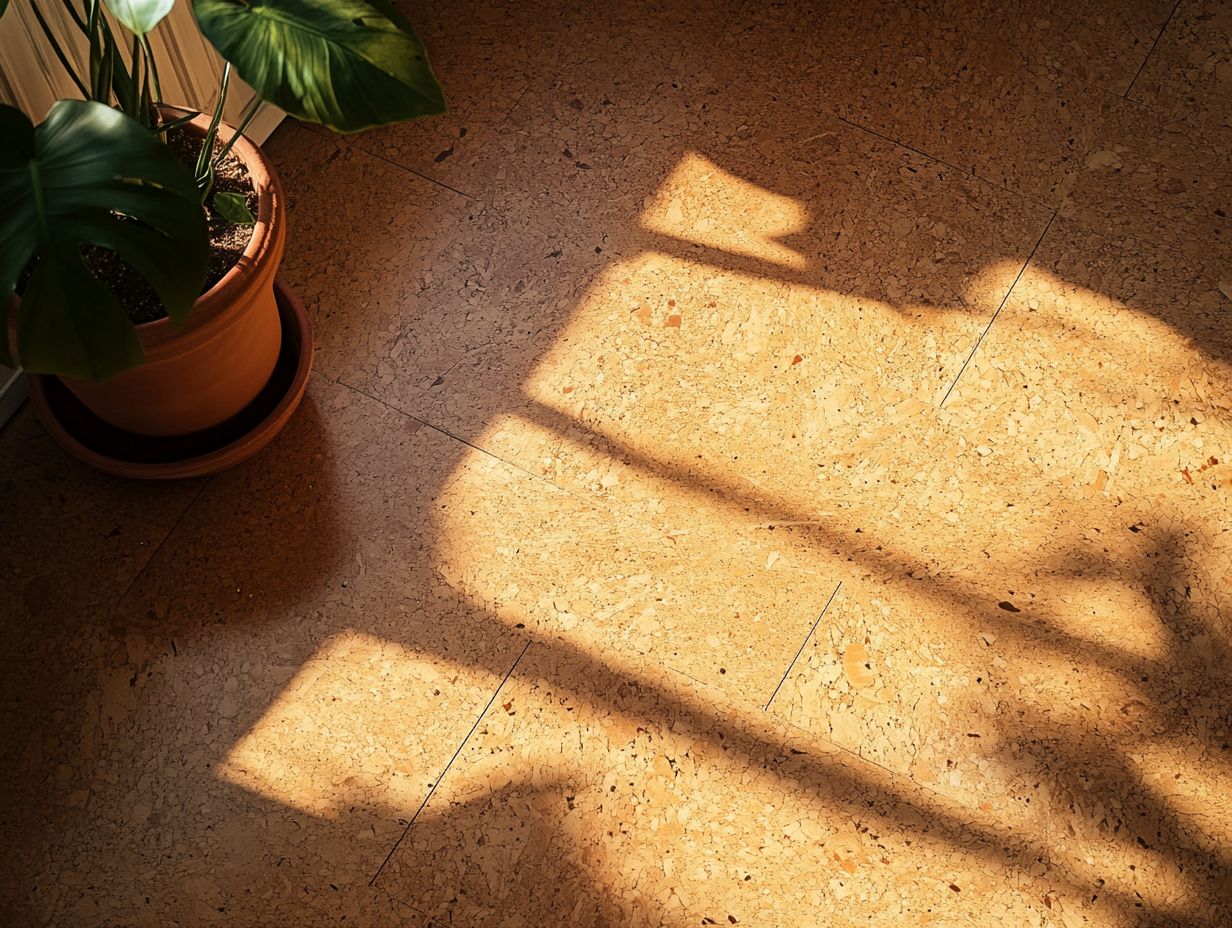
Cork is a flexible and eco-friendly material that offers many benefits as flooring. It is durable, comfortable, and great for insulation!
How does cork flooring compare to other types of flooring materials?
Cork flooring has distinct advantages over hardwood, carpet, and vinyl. It’s durable, comfortable, and environmentally friendly, making it an excellent choice for homeowners.
Is cork flooring suitable for high-traffic areas?
Absolutely! Cork flooring is incredibly durable and can handle heavy foot traffic, making it perfect for entryways, hallways, and kitchens.
How does cork flooring provide insulation?
Cork is a natural insulator. It helps regulate your room’s temperature, keeping it warm in winter and cool in summer, leading to energy savings!
Is cork flooring easy to maintain?
Yes! Cork flooring is low-maintenance and naturally resists mold, mildew, and pests. Just regular sweeping and an occasional mop will keep it looking beautiful.
Is cork flooring environmentally friendly?
Cork flooring is one of the most eco-friendly options available. It’s a renewable resource, and harvesting cork does not harm the cork oak tree. Plus, it’s biodegradable, making it a smart choice for your home!




